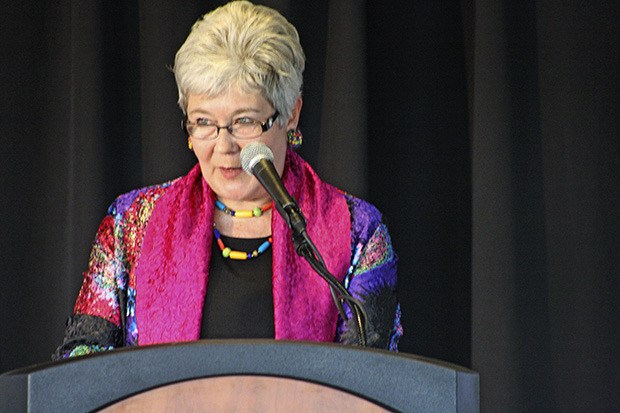Mayor Suzette Cooke accused the City Council of treating the Kent Chamber of Commerce as another council member after it overturned her veto about how to spend business and occupation (B&O) tax revenue.
The council voted 5-2 on Tuesday night in favor of an amended ordinance for the city to spend all B&O revenue (after staff costs) on street repairs rather than a $4.7 million cap with excess funds used to pay down internal city debt in the capital improvement fund, which helps pay for streets, parks, information technology and other projects. The change will go into effect in January 2017.
The chamber supports using all funds for street repairs and lobbied the council to overturn the mayor’s veto.
“It’s positioning the Chamber of Commerce in a position of being an eighth city council member,” Cooke said during an interview after the vote. “It’s a bit curious to me. I as a past executive director of a chamber (Renton) get it. It’s a coup for the chamber to have had that great of influence on members of city government.”
Under the current code, the first $700,000 collected of a $4.7 million cap goes to cover staff costs for six employees with $4 million to street repairs and any extra revenue (estimated to be about $800,000 per year) used to pay down debt.
Cooke issued her first veto during her 10 years in office two weeks ago when the council first approved the ordinance on a 4-3 vote. The council needed at least five votes to overturn the veto.
“We are way underfunded,” Cooke said as the city continues to scramble to fund projects. “We will pay off the internal debt within the next two years with that money, but then it straps the council with the only option for those dollars on roads. And it appears those are road options that the chamber wants to have done.”
Council members Les Thomas, Bill Boyce, Jim Berrios, Brenda Fincher and Dana Ralph voted in favor of the ordinance. Dennis Higgins and Deborah Ranniger were against it.
Berrios said prior to the vote that when the council first approached the chamber in 2012 about adopting a B&O tax (which became effective in 2013), it told business leaders the revenue would be spent on street repairs. Berrios wasn’t on the council at that time but had chamber membership. He and his wife own the Golden Steer Steak ‘n’ Rib House on East Hill.
“I was one of those businesses that sat in on the initial meetings with the chamber where city council (members) presented to us a packet of projects they wanted to use this ordinance for,” Berrios said. “In going through that process the initial reaction of the business community was a lot of resistance. I have to hand it to the leadership of the chamber that took a presence to work with them and come up with a solution to address the infrastructure.
“We submitted a letter of conditions we would like to see because we are paying the bill. … Then what ended up happening with the final ordinance, I walked away that as a business community we were misled. It really bothered me, and frankly that’s why I ran for city council. … If you say you are going to do one thing and end up doing something else with that money, there is something fundamentally wrong with that process.”
Boyce said he remembers telling the business community the money would be used for street repairs.
“That was our intent to ask for the B&O money,” Boyce said. “We have serious problems with our roads.”
Higgins and Ranniger opposed the measure in part because of concerns about what the change could do to the city’s bond ratings, which were recently upgraded by Moody’s Investors Service and Standard & Poor’s. Ranniger also added it creates an imbalance with how the city spends money.
“The mayor in her veto mentioned that $7.2 million city dollars are spent on roads in contrast to $500,000 on capital for parks and $1.7 million on IT (information technology) projects,” Ranniger said. “This will just make that imbalance much larger.”
Cooke said the council created more financing problems for itself by restricting B&O funds only to streets.
“I think it is very problematic for the council to limit the use of a general tax as the B&O tax is everywhere else,” Cooke said. “No city has dedicated the full (B&O) tax to one thing. No city has strapped it at 100 percent to one particular type of expenditure as this council has.”
The dispute between the mayor and the council about the B&O tax heated up during last year’s budget deliberations when Cooke proposed raising the tax to bring in $3 million per year to the general fund. The council never took any action on her proposal.
Talk to us
Please share your story tips by emailing editor@kentreporter.com.
To share your opinion for publication, submit a letter through our website https://www.kentreporter.com/submit-letter/. Include your name, address and daytime phone number. (We’ll only publish your name and hometown.) Please keep letters to 300 words or less.

